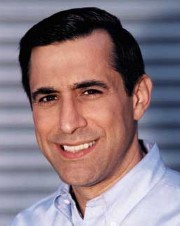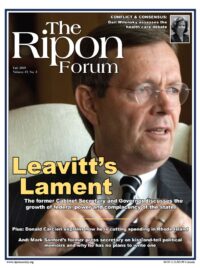 In the face of the growing challenges, Congress must scrupulously guard its Constitutional responsibility to ensure a fair, accurate and trustworthy count for the 2010 Census.
In the face of the growing challenges, Congress must scrupulously guard its Constitutional responsibility to ensure a fair, accurate and trustworthy count for the 2010 Census.
Since antiquity, nation-states have needed a reliable headcount of the population to know what size of army could be raised, what taxes could be levied, and to keep governing officials apprised of the customs, habits and social structures of the citizens living in remote areas of the empire.
Today, the Census is just as important to our Republic. It is the very foundation of our representative system of government, and it is not surprising that it presents a source of incredible political controversy. Professional partisans seeking to influence the apportionment of Congressional seats based on Census results or manipulate the distribution of federal dollars arise to advocate the use of dubious mathematical estimates rather than an actual headcount. Elected officials from states and cities large and small, urban and rural, marshal tremendous efforts to make sure their constituents get counted.
Indeed, the American Census is the largest peacetime mobilization of resources, both human and otherwise, undertaken throughout our history. Along with the Census come regular threats to subvert a full and fair counting.
…the American Census is the largest peacetime mobilization of resources, both human and otherwise, undertaken throughout our history. Along with the Census come regular threats to subvert a full and fair counting.
The frontal assault comes in the form of “statistical adjustment,” or the use of estimates to achieve population counts. Proponents of statistical adjustment argue that no Census can count every single person within the United States – a fact that everyone readily acknowledges. Because the undercounted population typically lives in poor, urban areas, it is argued that complex mathematical estimates should be employed to achieve a more equitable representation in Congress for these urban areas.
Of course, these arguments aren’t the result of the phenomenon of urbanization in modern American life. During the public debate over the ratification of the Constitution, our nation’s Founding Fathers wrestled with the issue of using estimates to count the fledgling country’s citizens. Then, it was the virgin wilderness, dense forests and primitive modes of transportation that made an actual headcount difficult. Nevertheless, the Founders overwhelmingly rejected the use of estimates in favor of an actual headcount, realizing the only fair way to enumerate the people was house by house, head by head.
There are other routine challenges to overcome. This month, the Government Accountability Office (GAO) released a report that highlighted various problems that are facing the 2010 Census, including weaknesses in the Census Bureau’s information technology, problems with the equipment used in canvassing, and uncertainty over the ultimate cost of the Census – now estimated at $14.7 billion. Simply put, the Bureau created to conduct the Census every ten years struggles to keep pace with technological advances that occur every ten minutes. Remarkably, however, GAO reported that the Census Bureau is making “noteworthy gains in mitigating risks and in keeping the headcount on-track.”
This year, there were new, yet unsurprising challenges that threatened the Census. Early in his administration, President Obama stepped up efforts to cut out the Census Bureau’s superiors at the Department of Commerce and have the Census Director report to his Chief of Staff, Rahm Emanuel. This plan raised the concern that politics would interfere with the Census Bureau’s work and thus jeopardize the independence needed to carry out a Constitutional mandate. After the public outcry over the politicization of the Census escalated, the White House walked back the President’s power grab.
More subtly, then, the President seemingly ran afoul of the Constitution’s requirement of Congressional advise and consent when the man publicly acknowledged to be his original choice for Director of the Census, Kenneth Prewitt, withdrew his name from consideration. Shortly thereafter, Prewitt was hired by the Administration as a paid consultant for the 2010 Census, reinforcing concerns that President Obama was circumventing the proper nomination and confirmation process in the U.S. Senate to give his political ally a place of key influence over the Census.
In the great sea of partisanship that is the seat of federal government, a lone island of nonpartisan calm must always be the United States Census Bureau.
Other scandals have fed an atmosphere of doubt about the legitimacy of the 2010 Census under President Obama’s watch. Earlier this year, it became known that the notorious and largely discredited Association of Community Organizations for Reform Now (ACORN) had received a Census Bureau contract. Thanks to the diligent efforts of my colleagues on the House Oversight Committee, particularly Rep. Patrick McHenry (R-NC) and Rep. Lynn Westmoreland (R-GA), the ACORN contract was withdrawn, but only after the now-infamous ACORN videos became public.
Washington, DC is by its nature a very political environment. In the great sea of partisanship that is the seat of federal government, a lone island of nonpartisan calm must always be the United States Census Bureau. Any effort to colonize it with party loyalists – whether Republican or Democrat – or tinker with the Census results must be stopped if the American people are to have confidence in their government.
Darrell Issa represents the 49th District of California in the U.S. House of Representatives. He is the Ranking Member of the House Committee on Oversight and Government Reform.




